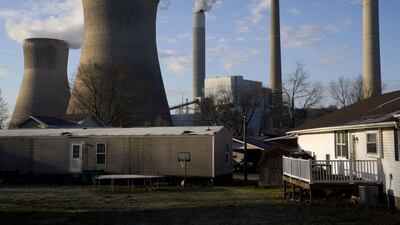The world's top banks provided $742 billion in finance to the fossil fuel industry in 2021, little changed on the prior year, a report on Wednesday showed, despite growing calls to rein in lending to help tackle global warming.
Banks are increasingly in the crosshairs of investors and campaigners over their role in bankrolling coal, oil and gas — the leading causes of man-made greenhouse gas emissions.
Most leading banks have pledged to reach net-zero emissions across their financing by 2050.
But, despite the International Energy Agency saying no new oil and gasfields should be developed for the world to hit its climate goals, the report showed finance continues to flow.
Last year, $185.5bn was provided to the 100 companies doing the most to expand production, the Banking on Climate Chaos report, written by NGOs including Rainforest Action Network, BankTrack and Oil Change International, said.
The report covered loan deals as well as equity and debt capital markets underwriting.
"These financial institutions are directly complicit in undermining a climate stable future for us all and must immediately end their support of any further fossil fuel infrastructure expansion," said Alison Kirsch, research and policy manager at Rainforest Action Network.
While overall lending was little changed from the prior year's $750bn, it remained higher than in 2016 and 2017, even though the world economy is still recovering from the Covid-19 pandemic, the report said.
Overall lending to the fossil fuel sector remained dominated by North American banks including JP Morgan, Wells Fargo, Scotiabank and RBC, all of which increased their financing over 2021, the report said.
For tar sands, which require high levels of energy to extract oil, financing rose 51 per cent to $23.3bn, the report said, led by Canadian banks including TD.
"Our planet is staring down a point of no return, and the world’s largest financial institutions are pouring gasoline on the fire," said US Congresswoman Rashida Tlaib.
A representative for JP Morgan said the bank was taking "pragmatic steps" to meet its 2030 emission reduction target for the sector, "while helping the world meet its energy needs securely and affordably".
RBC said it was working with stakeholders to reduce emissions and said the NGOs' report historically did not adequately account for how the finance was being used, nor the sustainability and transition plans of the recipients.
TD said it had yet to analyse the report in detail so was not able to comment on it, but added it was making "significant progress" on its environmental, social and governance-related goals.
Scotiabank declined to comment. Wells Fargo was not immediately available to comment.
Stage results
1. Julian Alaphilippe (FRA) Deceuninck-QuickStep 4:39:05
2. Michael Matthews (AUS) Team BikeExchange 0:00:08
3. Primoz Roglic (SLV) Jumbo-Visma same time
4. Jack Haig (AUS) Bahrain Victorious s.t
5. Wilco Kelderman (NED) Bora-Hansgrohe s.t
6. Tadej Pogacar (SLV) UAE Team Emirates s.t
7. David Gaudu (FRA) Groupama-FDJ s.t
8. Sergio Higuita Garcia (COL) EF Education-Nippo s.t
9. Bauke Mollema (NED) Trek-Segafredo s.t
10. Geraint Thomas (GBR) Ineos Grenadiers s.t
Profile of Tarabut Gateway
Founder: Abdulla Almoayed
Based: UAE
Founded: 2017
Number of employees: 35
Sector: FinTech
Raised: $13 million
Backers: Berlin-based venture capital company Target Global, Kingsway, CE Ventures, Entrée Capital, Zamil Investment Group, Global Ventures, Almoayed Technologies and Mad’a Investment.
What%20is%20cystic%20fibrosis%3F
%3Cul%3E%0A%3Cli%3ECystic%20fibrosis%20is%20a%20genetic%20disorder%20that%20affects%20the%20lungs%2C%20pancreas%20and%20other%20organs.%3C%2Fli%3E%0A%3Cli%3EIt%20causes%20the%20production%20of%20thick%2C%20sticky%20mucus%20that%20can%20clog%20the%20airways%20and%20lead%20to%20severe%20respiratory%20and%20digestive%20problems.%3C%2Fli%3E%0A%3Cli%3EPatients%20with%20the%20condition%20are%20prone%20to%20lung%20infections%20and%20often%20suffer%20from%20chronic%20coughing%2C%20wheezing%20and%20shortness%20of%20breath.%3C%2Fli%3E%0A%3Cli%3ELife%20expectancy%20for%20sufferers%20of%20cystic%20fibrosis%20is%20now%20around%2050%20years.%3C%2Fli%3E%0A%3C%2Ful%3E%0A
Tearful appearance
Chancellor Rachel Reeves set markets on edge as she appeared visibly distraught in parliament on Wednesday.
Legislative setbacks for the government have blown a new hole in the budgetary calculations at a time when the deficit is stubbornly large and the economy is struggling to grow.
She appeared with Keir Starmer on Thursday and the pair embraced, but he had failed to give her his backing as she cried a day earlier.
A spokesman said her upset demeanour was due to a personal matter.
More on animal trafficking
England squad
Moeen Ali, James Anderson, Jofra Archer, Jonny Bairstow, Dominic Bess, James Bracey, Stuart Broad, Rory Burns, Jos Buttler, Zak Crawley, Sam Curran, Joe Denly, Ben Foakes, Lewis Gregory, Keaton Jennings, Dan Lawrence, Jack Leach, Saqib Mahmood, Craig Overton, Jamie Overton, Matthew Parkinson, Ollie Pope, Ollie Robinson, Joe Root, Dom Sibley, Ben Stokes, Olly Stone, Amar Virdi, Chris Woakes, Mark Wood
COMPANY%20PROFILE
%3Cp%3E%3Cstrong%3EName%3A%20%3C%2Fstrong%3ESmartCrowd%0D%3Cbr%3E%3Cstrong%3EStarted%3A%20%3C%2Fstrong%3E2018%0D%3Cbr%3E%3Cstrong%3EFounder%3A%20%3C%2Fstrong%3ESiddiq%20Farid%20and%20Musfique%20Ahmed%0D%3Cbr%3E%3Cstrong%3EBased%3A%20%3C%2Fstrong%3EDubai%0D%3Cbr%3E%3Cstrong%3ESector%3A%20%3C%2Fstrong%3EFinTech%20%2F%20PropTech%0D%3Cbr%3E%3Cstrong%3EInitial%20investment%3A%20%3C%2Fstrong%3E%24650%2C000%0D%3Cbr%3E%3Cstrong%3ECurrent%20number%20of%20staff%3A%3C%2Fstrong%3E%2035%0D%3Cbr%3E%3Cstrong%3EInvestment%20stage%3A%20%3C%2Fstrong%3ESeries%20A%0D%3Cbr%3E%3Cstrong%3EInvestors%3A%20%3C%2Fstrong%3EVarious%20institutional%20investors%20and%20notable%20angel%20investors%20(500%20MENA%2C%20Shurooq%2C%20Mada%2C%20Seedstar%2C%20Tricap)%3C%2Fp%3E%0A
SPECS
%3Cp%3E%3Cstrong%3EEngine%3A%3C%2Fstrong%3E%20Dual%20electric%20motors%20with%20102kW%20battery%20pack%3C%2Fp%3E%0A%3Cp%3E%3Cstrong%3EPower%3A%20%3C%2Fstrong%3E570hp%3C%2Fp%3E%0A%3Cp%3E%3Cstrong%3ETorque%3A%3C%2Fstrong%3E%20890Nm%3C%2Fp%3E%0A%3Cp%3E%3Cstrong%3ERange%3A%3C%2Fstrong%3E%20Up%20to%20428km%3C%2Fp%3E%0A%3Cp%3E%3Cstrong%3EOn%20sale%3A%3C%2Fstrong%3E%20Now%3C%2Fp%3E%0A%3Cp%3E%3Cstrong%3EPrice%3A%20%3C%2Fstrong%3EFrom%20Dh1%2C700%2C000%3C%2Fp%3E%0A
Our legal columnist
Name: Yousef Al Bahar
Advocate at Al Bahar & Associate Advocates and Legal Consultants, established in 1994
Education: Mr Al Bahar was born in 1979 and graduated in 2008 from the Judicial Institute. He took after his father, who was one of the first Emirati lawyers
UAE currency: the story behind the money in your pockets
Lexus LX700h specs
Engine: 3.4-litre twin-turbo V6 plus supplementary electric motor
Power: 464hp at 5,200rpm
Torque: 790Nm from 2,000-3,600rpm
Transmission: 10-speed auto
Fuel consumption: 11.7L/100km
On sale: Now
Price: From Dh590,000
Infiniti QX80 specs
Engine: twin-turbocharged 3.5-liter V6
Power: 450hp
Torque: 700Nm
Price: From Dh450,000, Autograph model from Dh510,000
Available: Now
Killing of Qassem Suleimani
KEY DEVELOPMENTS IN MARITIME DISPUTE
2000: Israel withdraws from Lebanon after nearly 30 years without an officially demarcated border. The UN establishes the Blue Line to act as the frontier.
2007: Lebanon and Cyprus define their respective exclusive economic zones to facilitate oil and gas exploration. Israel uses this to define its EEZ with Cyprus
2011: Lebanon disputes Israeli-proposed line and submits documents to UN showing different EEZ. Cyprus offers to mediate without much progress.
2018: Lebanon signs first offshore oil and gas licencing deal with consortium of France’s Total, Italy’s Eni and Russia’s Novatek.
2018-2019: US seeks to mediate between Israel and Lebanon to prevent clashes over oil and gas resources.
MATCH INFO
Juventus 1 (Dybala 45')
Lazio 3 (Alberto 16', Lulic 73', Cataldi 90 4')
Red card: Rodrigo Bentancur (Juventus)
Fast%20X
%3Cp%3E%3Cstrong%3EDirector%3A%3C%2Fstrong%3E%20Louis%20Leterrier%3C%2Fp%3E%0A%3Cp%3E%3Cstrong%3EStars%3A%3C%2Fstrong%3E%20Vin%20Diesel%2C%20Michelle%20Rodriguez%2C%20Jason%20Statham%2C%20Tyrese%20Gibson%2C%20Ludacris%2C%20Jason%20Momoa%2C%20John%20Cena%2C%20Jordana%20Brewster%2C%20Nathalie%20Emmanuel%2C%20Sung%20Kang%2C%20Brie%20Larson%2C%20Helen%20Mirren%20and%20Charlize%20Theron%3C%2Fp%3E%0A%3Cp%3E%3Cstrong%3ERating%3A%3C%2Fstrong%3E%203%2F5%3C%2Fp%3E%0A


